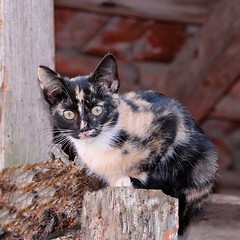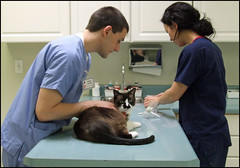FIP is not a contagious disease!
Friday, March 6th, 2009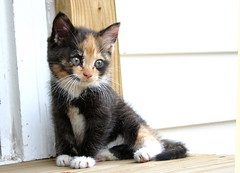 If your family includes cats or you know someone who lives with cats, please read this. I’m wandering back to the side of western medicine but this is a topic dear to my heart.
If your family includes cats or you know someone who lives with cats, please read this. I’m wandering back to the side of western medicine but this is a topic dear to my heart.
When I was working at the shelter I once got a voice mail from a client who had adopted a cat from us who came down with FIP and died. She was calling because she was angry that we had not tested for it and mentioned that her vet was recommending she euthanize her other two cats because they had been exposed and would most certainly come down with it and die. Of course I couldn’t get a hold of her and two of us spent the rest of the day frantically trying to reach her before she killed her two other cats. Luckily we did reach her in time.
FIP or Feline Infectious Peritonitis is one of the most misunderstood diseases in veterinary medicine. It is not contagious but it is a mutation of a contagious disease. It can not be diagnosed in a living cat yet there is a “FIP test”. There is a vaccine but it doesn’t work in most cats and there is some thought that it can actually help to induce FIP.
So let’s start at the beginning.
There is a virus in cats called Feline Coronavirus. This virus usually doesn’t cause illness or if it does just a little diarrhea or intestinal inflammation. It targets only gut cells. It is very common. Up to 80% of cats have been exposed to it and show an antibody titer. In multiple cat households and shelters and catteries up to 100% of cats have been exposed to it.
Sometimes for reasons that we do not know this virus mutates or changes into FIP, kind of like what happened to the Gremlins when they got wet. We think it is related to a weak immune system but we aren’t sure. FIP can attack any cells in the body by working through the white blood cells and it does, causing many symptoms such as a bloated and fluid filled abdomen, diarrhea, vomiting, a fever, lethargy, poor appetite, problems breathing and sometimes brain inflammation. Almost all cats with FIP die.
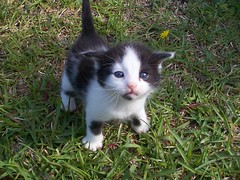 Occasionally two cats from the same household die of FIP. We used to think one had caught FIP from the other. However recently when researchers have studied where the mutation is in the virus they have found that the mutation will be different in each cat.
Occasionally two cats from the same household die of FIP. We used to think one had caught FIP from the other. However recently when researchers have studied where the mutation is in the virus they have found that the mutation will be different in each cat.
What does this mean?
It means that each mutation happened independently within that cat’s body. If they were passing the mutated FIP virus the mutation would be the same in each animal. This means that the FIP virus is not being passed once it mutates and is not contagious.
Why are cats is multiple cat households more likely to get FIP then?
Multiple cat households have a higher rate of coronavirus in them. The more coronavirus shed in a cat’s feces and picked up by other cats, the greater the chance there is for a mutation to FIP.
So how does a vet test for FIP?
There is a titer test called the FIP test. The only problem is that it tests for coronavirus not for FIP. Usually cats with FIP will have a high coronavirus titer but not always. And many cats without FIP will have a high titer. So a positive “FIP test” may point towards a diagnosis of FIP but also may not.
If a cat comes in with fluid in its abdomen which is common in FIP cats, the best test is a protein ratio run on the abdominal fluid. Most vets will also run bloodwork to test protein levels.
A high protein level in abdominal fluid with a low albumin/globulin (two proteins we look at) ratio with a high globulin level on bloodwork, and a high FIP/corona titer (positive FIP test) usually point towards FIP. That is the closest we can come. And many cats with FIP do not have all the above.
So why is there a vaccine if this is not a contagious disease?
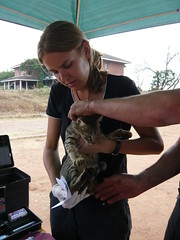 The short answer is because we used to think it was. The FIP vaccine will work to prevent coronavirus in about 60-80% of the 20% of cats that have not been exposed to coronavirus ever. Or about 12-16% of cats. It will not work if cats have been exposed to coronavirus. In addition there is some thought that if the cat has coronavirus in its body the vaccine could induce that coronavirus to mutate to FIP. So the vaccine works in 12-16% of cats but may actually induce disease in the ones it doesn’t work for. Hmmm. Not very good odds if you ask me.
The short answer is because we used to think it was. The FIP vaccine will work to prevent coronavirus in about 60-80% of the 20% of cats that have not been exposed to coronavirus ever. Or about 12-16% of cats. It will not work if cats have been exposed to coronavirus. In addition there is some thought that if the cat has coronavirus in its body the vaccine could induce that coronavirus to mutate to FIP. So the vaccine works in 12-16% of cats but may actually induce disease in the ones it doesn’t work for. Hmmm. Not very good odds if you ask me.
There is no good treatment for FIP beyond supportive care and most cats with it will die within a year or often times much less. In multiple cat households cleanliness, especially of litter boxes, can help cut down on the level of coronavirus, which helps prevent FIP.
Here’s some interesting resources on FIP
Wikipedia article on Feline Infectious Peritonitis
FAB on FIP
Cornell Feline Health Center FIP
Comments are closed on this article. There are only so many ways I can say that FIP is not contagious. It is not.
